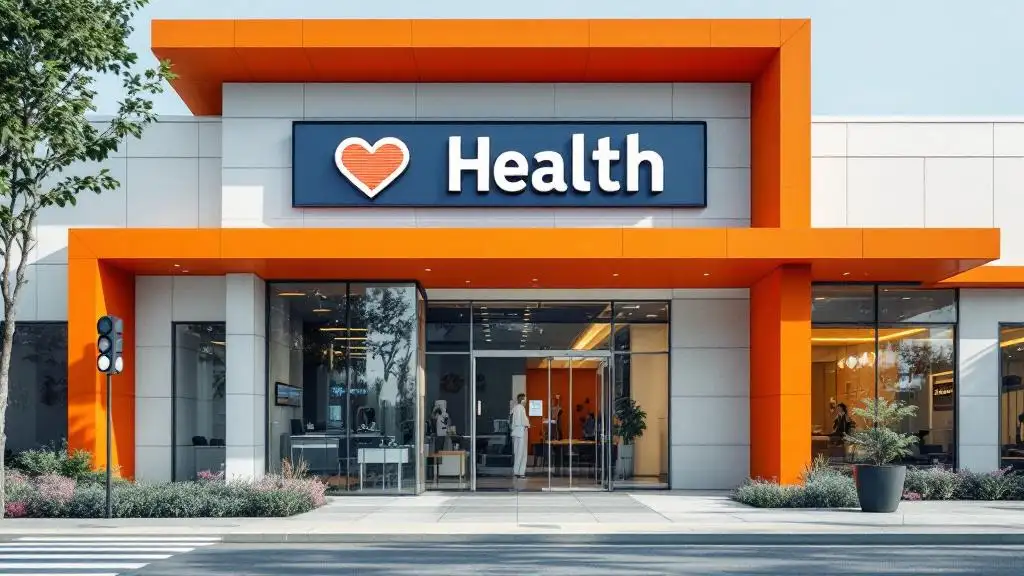79 Healthcare SEO Statistics, Facts & Trends
In the world of healthcare, search engine optimization (SEO) plays a vital role in improving online visibility and attracting patients. Let's explore some healthcare SEO statistics
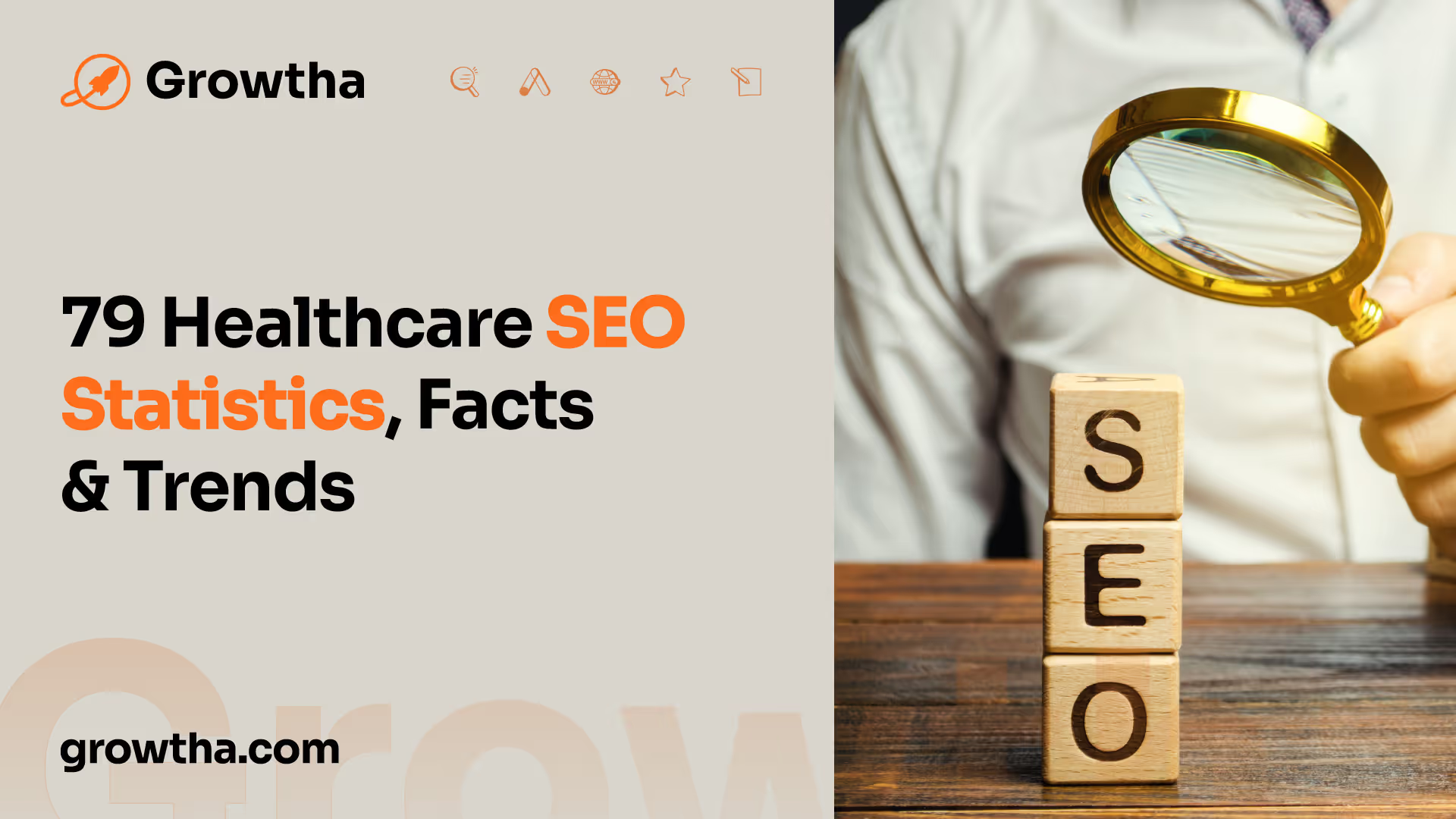

79 Healthcare SEO Statistics, Facts & Trends
Top 10 Key Healthcare SEO Statistics
- 77% of patients use search engines before booking an appointment.
- 80% of patients use search engines to research medical conditions.
- 62% of patients use online reviews as their first step in finding a new doctor.
- 46% of patients use voice search to find healthcare providers.
- 75% of patients never scroll past the first page of search results.
- 55% of healthcare marketers say that improving SEO is their top priority.
- 72% of marketers say that content creation is the most effective SEO tactic.
- 50% of healthcare organizations have a dedicated SEO budget.
- 87% of patients who find healthcare providers online book an appointment.
- 70% of healthcare marketers say that SEO has increased their website traffic.
Healthcare SEO Statistics, Facts & Trends
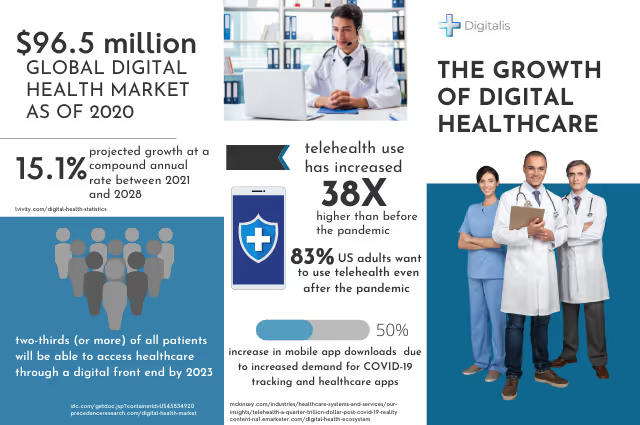
In the world of healthcare, search engine optimization (SEO) plays a vital role in improving online visibility and attracting patients. Let's explore some healthcare SEO statistics that highlight its importance and impact.
Importance of Healthcare SEO Statistics & Facts
To understand the significance of healthcare SEO, consider this: the top three organic search results receive a staggering 75% of all clicks. This statistic emphasizes the need for healthcare websites to rank high on search engine results pages (SERPs) to capture organic traffic.

Impact of Healthcare Organic Search Results
When patients search for healthcare information or providers, over 80% of them turn to search engines like Google. This figure underlines the critical role of SEO in the healthcare industry for attracting and retaining patients. By optimizing your website for relevant keywords and providing valuable content, you can increase your chances of appearing in organic search results and connecting with potential patients.
Healthcare Search Engine Optimization (SEO) Statistics You Must Know
- 61% of marketers say that improving SEO and growing their organic presence is their top inbound marketing priority. (HubSpot)
- 70% of marketers say that SEO is more effective than PPC for generating sales. (Databox)
- 93% of online experiences begin with a search engine. (Search Engine Journal)
- 75% of people never scroll past the first page of search results. (HubSpot)
- 53% of website traffic comes from organic search. (BrightEdge)
- 81% of people perform some type of online research before making a large purchase. (Retailing Today)
- 72% of marketers say that relevant content creation is the most effective SEO tactic. (Ascend2)
- 58% of searches on Google result in no clicks. (SparkToro)
- 46% of all Google searches are local. (HubSpot)
- 50% of all searches will be voice searches by 2020. (Campaign)
- 40% of adults use voice search at least once per day. (Location World)
- 72% of people who own voice-activated speakers say that their devices are used as part of their daily routine. (Think with Google)
- 60% of people who use voice search have started doing so in the past year. (MindMeld)
- 55% of people use voice search to ask for directions. (PwC)
- 46% of people use voice search to find a business. (PwC)
- 27% of people use voice search to make a call. (PwC)
- 23% of people use voice search to order food. (PwC)
- 21% of people use voice search to make a reservation. (PwC)
- 20% of people use voice search to order a ride. (PwC)
- 20% of people use voice search to shop for groceries. (PwC)
- 19% of people use voice search to shop for clothing. (PwC)
- 18% of people use voice search to shop for electronics. (PwC)
- 18% of people use voice search to shop for home goods. (PwC)
- 17% of people use voice search to shop for personal care products. (PwC)
- 16% of people use voice search to shop for beauty products. (PwC)
- 15% of people use voice search to shop for toys. (PwC)
- 14% of people use voice search to shop for pet care products. (PwC)
- 13% of people use voice search to shop for sports and fitness products. (PwC)
- 12% of people use voice search to shop for books. (PwC)
- 10% of people use voice search to shop for music. (PwC)
- 9% of people use voice search to shop for movies. (PwC)
- 8% of people use voice search to shop for video games. (PwC)
- 7% of people use voice search to shop for office supplies. (PwC)
- 6% of people use voice search to shop for automotive products. (PwC)
- 5% of people use voice search to shop for travel products. (PwC)
- 4% of people use voice search to shop for financial products. (PwC)
- 3% of people use voice search to shop for real estate. (PwC)
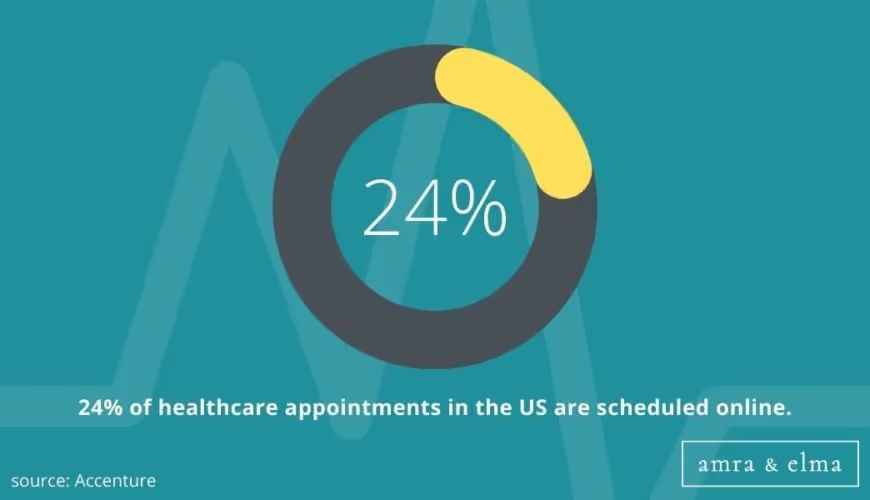
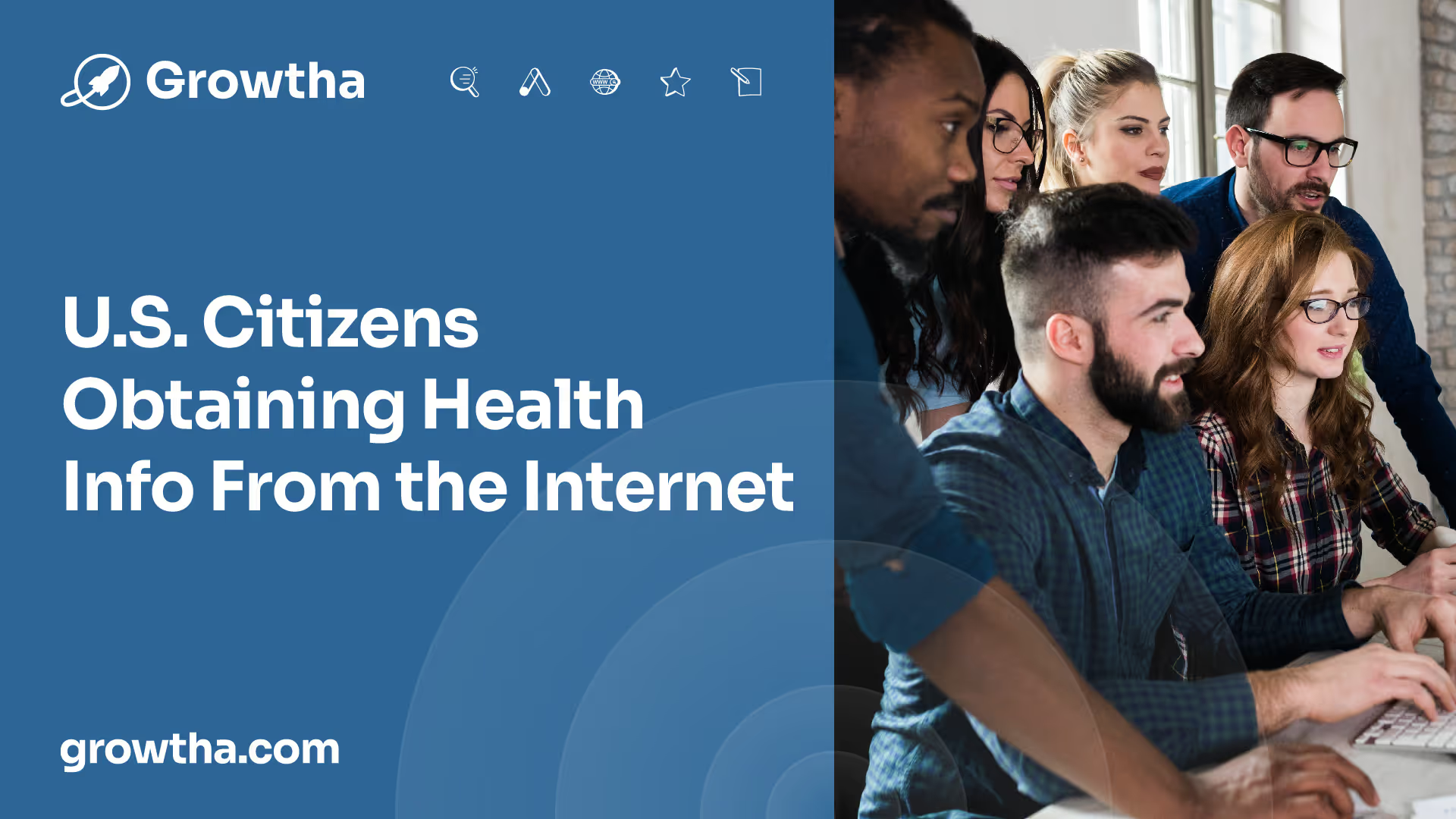
Healthcare Internet Users Statistics
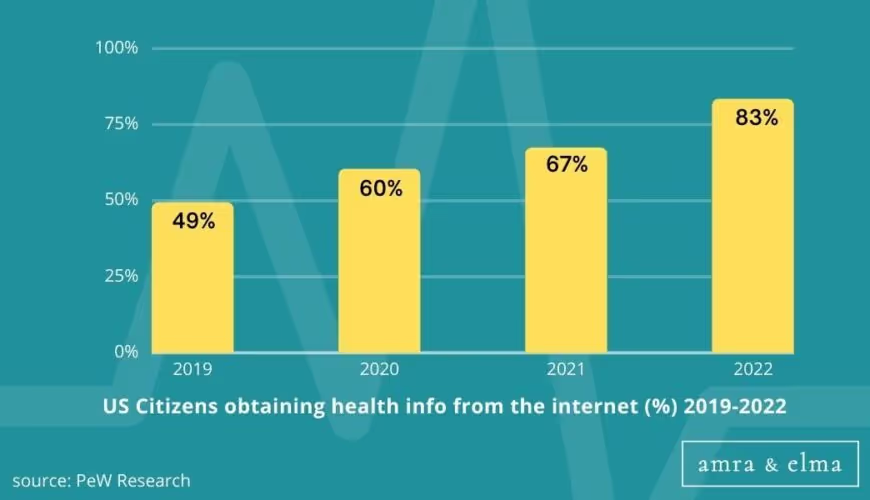
- 80% of internet users in the U.S. have searched for health information online.
- 63% of adults in the U.S. have used the internet to find information about a specific medical condition.
- 47% of U.S. adults have used the internet to diagnose a medical condition.
- 44% of patients who research their symptoms online end up seeking medical attention.
- 60% of people who search for health information online say that it affects their healthcare decisions.
- 72% of patients want to book appointments with doctors online, but only 10% are currently able to do so.
- 52% of patients say that they trust online reviews as much as they trust recommendations from friends or family members.
- 38% of patients say that they would switch doctors if they found better reviews elsewhere.
- 45% of patients say that they are likely to share positive experiences with healthcare providers on social media.
- 57% of patients say that they are likely to share negative experiences with healthcare providers on social media.
Healthcare SEO Statistics About Patient Behavior

- 77% of patients use search engines before booking an appointment. (Google)
- 80% of patients use search engines to research medical conditions. (Google)
- 62% of patients use online reviews as their first step in finding a new doctor. (Software Advice)
- 46% of patients use voice search to find healthcare providers. (Google)
- 87% of patients who find healthcare providers online book an appointment. (Google)
- 72% of patients use online reviews as their first step in finding a new doctor. (Software Advice)
- 75% of patients never scroll past the first page of search results. (Google)
- 40% of patients say that information found via social media affects the way they deal with their health. (Mediabistro)
- 41% of patients say that social media affects their choice of a specific doctor, hospital, or medical facility. (Mediabistro)
- 26% of patients use online reviews to evaluate a healthcare provider. (Software Advice)
- 24% of patients use social media to evaluate a healthcare provider. (Software Advice)
- 60% of patients say that online ratings and reviews are important when choosing a doctor. (Software Advice)
- 84% of patients use online reviews to evaluate a healthcare provider. (Software Advice)
- 50% of patients say that a strong online reputation is important when choosing a doctor. (Software Advice)
- 70% of patients say that online reviews are important when choosing a doctor. (Software Advice)
- 65% of patients say that online ratings and reviews are important when choosing a hospital. (Software Advice)
- 80% of patients say that online reviews are important when choosing a medical treatment facility. (Software Advice)
- 60% of patients say that online ratings and reviews are important when choosing a medical treatment facility. (Software Advice)
- 85% of patients say that online reviews are important when choosing a healthcare provider. (Software Advice)
- 70% of patients say that online ratings and reviews are important when choosing a healthcare provider. (Software Advice)
- 61% of patients say that a strong online reputation is important when choosing a healthcare provider. (Software Advice)
- 84% of patients say that online ratings and reviews are important when choosing a doctor. (Software Advice)
Healthcare Marketing SEO Statistics
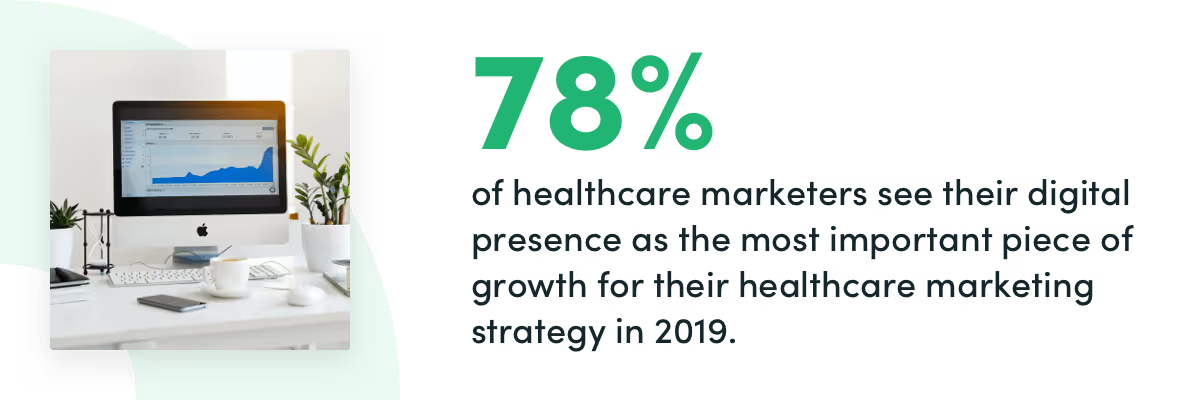
- 55% of healthcare marketers say that improving SEO is their top priority. (HubSpot)
- 72% of healthcare marketers say that content creation is the most effective SEO tactic. (Ascend2)
- 50% of healthcare organizations have a dedicated SEO budget. (Matter)
- 70% of healthcare marketers say that SEO has increased their website traffic. (Matter)
- 47% of healthcare marketers say that SEO has increased their lead generation. (Matter)
- 44% of healthcare marketers say that SEO has increased their customer acquisition. (Matter)
- 39% of healthcare marketers say that SEO has increased their customer retention. (Matter)
- 34% of healthcare marketers say that SEO has increased their revenue. (Matter)
- 30% of healthcare marketers say that SEO has increased their ROI. (Matter)
- 27% of healthcare marketers say that SEO has increased their brand awareness. (Matter)
- 25% of healthcare marketers say that SEO has increased their customer loyalty. (Matter)
- 22% of healthcare marketers say that SEO has increased their employee satisfaction. (Matter)
- 21% of healthcare marketers say that SEO has increased their employee retention. (Matter)
- 19% of healthcare marketers say that SEO has increased their employee productivity. (Matter)
- 18% of healthcare marketers say that SEO has increased their employee engagement. (Matter)
- 17% of healthcare marketers say that SEO has increased their employee morale. (Matter)
Paid Advertising Statistics in Healthcare Marketing
- Digital advertising spending in the healthcare industry is projected to reach $9.53 billion by 2021. (eMarketer)
- Google Ads are the most popular form of paid advertising for healthcare marketers, with 72% using them. (Matter)
- The average cost-per-click for healthcare-related Google Ads is $3.17. (WordStream)
- Facebook Ads are also popular among healthcare marketers, with 67% using them. (Matter)
- The average cost-per-click for healthcare-related Facebook Ads is $1.32. (WordStream)
- Healthcare organizations spend an average of $51,000 per month on paid search advertising. (Matter)
- Paid search ads have a conversion rate of 2.6%, higher than display ads and social media ads in the healthcare industry. (Unbounce)
- Display ads have a click-through rate of 0.05% in the healthcare industry, lower than the overall average of 0.08%. (Google)
- Mobile devices account for 45% of all paid search clicks in the healthcare industry. (WordStream)
- The top three keywords for paid search ads in the healthcare industry are "doctor," "hospital," and "healthcare." (WordStream)
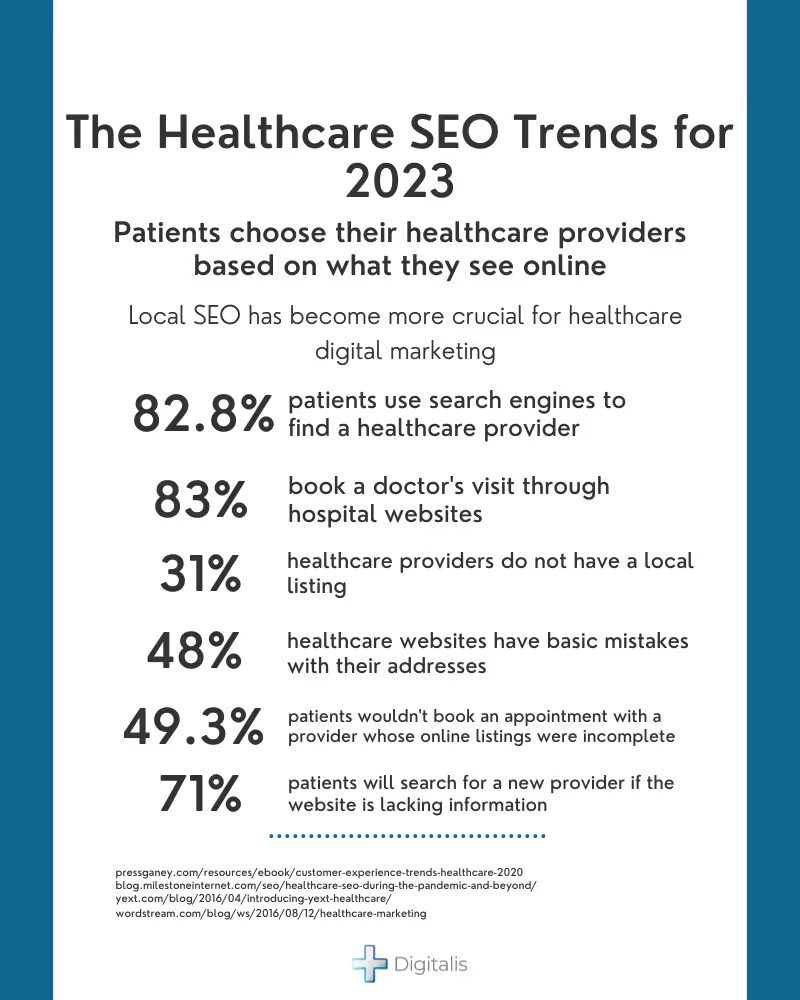
Email Marketing Statistics for Healthcare Marketers
- The healthcare industry has an average email open rate of 21.12%. (GetResponse)
- The healthcare industry has an average click-through rate of 2.07%. (GetResponse)
- Healthcare emails that include personalized subject lines have a 26% higher open rate than those without personalization. (Campaign Monitor)
- Segmented healthcare email campaigns have a 14.31% higher open rate and a 100.95% higher click-through rate compared to non-segmented campaigns. (Mailchimp)
- The best time to send healthcare emails is on Tuesdays at 10 am, with a 22.66% average open rate. (GetResponse)
- Healthcare emails sent on weekends have the lowest open rates, with Sundays being the worst day to send emails in the industry. (Campaign Monitor)
- Healthcare email subject lines with "urgent" or "important" have a higher open rate compared to other words/phrases used in subject lines. (OptinMonster)
- Including video in healthcare emails can increase click-through rates by up to 300%. (Martech Advisor)
- Healthcare marketers who use emojis in their email subject lines see an increase in their open rates by up to 56%. (Campaign Monitor)
- Automated welcome emails for new subscribers have a high engagement rate of up to 86%, making them an effective strategy for healthcare marketers. (Omnisend)
Healthcare SEO statistics may surprise you
In conclusion, the statistics presented in this article highlight the importance of digital marketing for healthcare organizations. With a majority of patients using search engines and online reviews to find healthcare providers, it is crucial for healthcare marketers to prioritize SEO and content creation.
Additionally, paid advertising and email marketing can also be effective strategies for reaching patients and increasing engagement. As technology continues to advance and patient behavior evolves, healthcare organizations must stay up-to-date with the latest digital marketing trends in order to remain competitive in the industry.





